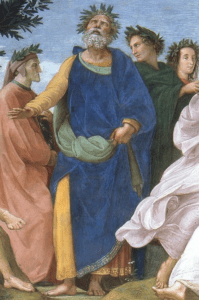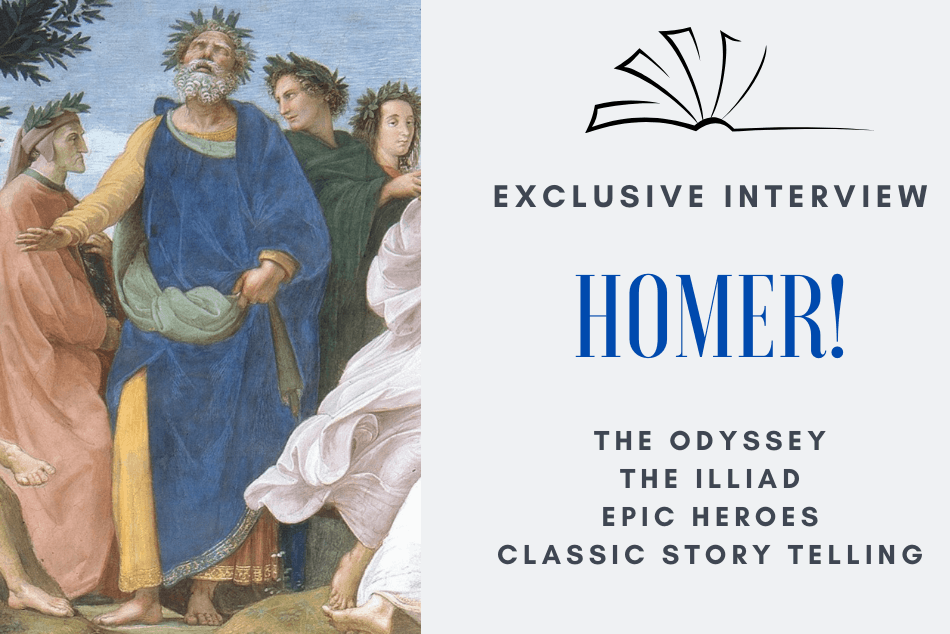A genre legend talks the Odyssey, the Iliad, secrets of classical storytelling, and what it’s like writing epic tomes.
Recent advancements in time travel have opened up new promotional possibilities for late and legendary authors seeking to spread the word. Bestselling and critically acclaimed Greek poet, Homer, author of the genre-busting mega-bestsellers the Odyssey and the Iliad, opens up in this unprecedented and candid conversation with Career Authors.
Career Authors: Your work has been controversial for millennia, with some scholars alleging that you didn’t write the books attributed to you, or that you only wrote some of them. This debate has even resulted in the now-infamous “Homeric Question”: Did you or did you not write the Iliad and the Odyssey?
Homer: (sighs) Damn critics. Does it matter? Did you ask James Patterson whether he wrote all his bestsellers when you interviewed him? And do you really think Omorosa wrote her own book?
Anyway, my two most popular works were undoubtedly the brainchild of my singular poetic genius, though I am aware that there are those that swear these epic tomes are the product of many contributors and took shape over decades if not centuries from rework and revision.
It simply does not matter. Shouldn’t you evaluate a book on its own merits? Did the same author write all the titles in The Baby-Sitters Club? At any rate, it’s not unknown for authors to continue publishing books post-mortem—thinking now of Robert Ludlum and W.E.B Griffin … I’m looking at you, Brian Andrews.
Career Authors: Obviously, you didn’t have the luxury of a MacBook Pro to write and save your work in Eighth Century BCE. Is that why you chose to compose in Hexameter Poetry instead of using the chapter-based storytelling format that is standard today?
Homer: (laughs) Zeus, what I would have given for a computer in my day! Believe me, revisions take up way too much of my time, and my rooms are littered with scrolls. It’s a fire hazard.
The Odyssey contains 12,109 verses and the Iliad has 15,693. Together, that’s 27,802 verses. That roughly translates to 1,100 pages combined—so, the answer is yes, a computer would have been helpful. On the other hand, I avoided descending into those endless rabbit holes of Google searches.
Today’s publishers may foolishly scoff at publishing poetry, but in my day all storytelling was oral. Dactylic hexameter structure is not only functional but pleasing when spoken aloud. In translation, it loses its syllabic structure, but the beauty remains:
Sing to me of the man, Muse, the man of twists and turns,
Driven time and again off course…
Reading one’s own work can be so rewarding, don’t you agree? To be immodest for just one moment, I admit I absolutely love that opening: it’s lyrical, metaphorical, and literal. Further, it strikes me that the oral tradition is making a big comeback, and I’m not just talking about Jay-Z’s spoken word. I read in Publishers Weekly that audio books sales have gone through the roof.
It’s very much like in my time, when stories were told by expert performers. There is nothing new under the sun.
Career Authors: Odysseus is, in many scholars’ opinions, the original action hero. What drives him and why do you think he is still relatable today?
Homer: Those blasted scholars again! Must you couch your questions that way? It’s the readers that matter. But to answer your question, yes.
Eons before Rambo, Jack Ryan, and Luke Skywalker, there was Odysseus.
Here’s a fellow who fate seemed to single out and chosen to torment— you know the feeling? In reality, his tormenter is—spoiler alert! — Poseidon, but the gods move and act with invisible hands. This poor guy never knows when and how he’s being punished or if it’s simply circumstance. Odysseus’ tenacity and never-quit attitude are what make him both heroic and still relevant in today’s market.
In the modern age of comic book adaptations and superheroes, Odysseus would be an outlier. He is to Achilles what Batman is to Superman.
Odysseus does not have super strength or impenetrable skin, he has only his wiles and combat skills learned on the battlefield to rely upon.
With heroes like him, wits and will rule the day—sort of like your John Dempsey Navy SEAL character, wouldn’t you say, Brian Andrews?
Career Authors: For readers who might not have yet read your work, can you make a case for their current relevance?
Homer: What an absurd request! Certainly, Hollywood needs no convincing since not too long ago the Iliad was remade as the film Troy. Troy made over $497 million worldwide. Did it escape your notice that Brad Pitt played the lead? That’s the dream of every writer—not just us Greek guys.
Career Authors: But aren’t you just another old, white dude shoving Western culture down our throats?
Homer: It’s true that The Iliad is considered one of the earliest works of the Western canon. I don’t apologize for that, nor does that take anything away from other amazing works from diverse authors in the world. I say, read everything: read Sappho and Antigone. Read the epic Zulu poem Emperor Shaka the Great, Pablo Neruda’s Love Poems and Sun Tzu’s The Art of War. Read more, censor less.
I welcome the study of my work from new perspectives. Circe is a recent bestseller written by Madeline Miller—she unapologetically riffs on the Odyssey! Am I angry? Not much, for it proves—if proof is needed by the likes of you—that my themes are universal and entirely pertinent today. The Odyssey follows the tragic and thrilling adventures of the world’s first action hero—
Career Authors: Oh! So you embrace the words of critics when they praise you, but scoff at their questions and criticism.
Homer: (feigning humility) I will now quote a Greek proverb: “Pay attention to your enemies, for they are the first to discover your mistakes.” On occasion, Goodreads reviews and rejection letters may prove useful.
Anyway, I must pull blurbs from these dastardly critics to put on my book covers. Book promotion forces writers to endure many such trials. Sometimes I feel like Odysseus himself, cursed at once by both fate and publishers!
But to return to the question of relevance. Like all of us, Odysseus is beset by challenges every day. He is a man of great personal courage and inner strength but also flawed in many ways. He’s an anti-hero like those popular in today’s thriller market, rather he is a hero who becomes unvarnished as we read. All of his shine is stripped away, and we see him as a man—scarred and imperfect but unwilling to bend the knee to the gods who torment him.
The Iliad, on the other hand, is what some have called the original Game of Thrones—a tale that peers into the heart of man and the machinations of the mind. Deceit, manipulation, motive, and entanglement make up the foundation of the narrative. Where plotting and hero’s journey power The Odyssey, character and thorny politics are the fuel that drive the engine in the Iliad.
Career Authors: Here at Career Authors, we always ask our guests what advice they might have for aspiring authors.
Homer: Since all great writers are thieves, I will again quote Greek philosophers: Heed the words of Aristotle: “Well begun is half done.” To finish a book, you must first begin. But do not forget: “Whatever is good to know is difficult to learn.” Writing is hard; there’s no way around it, but those who are truly dedicated will remain undaunted—heroic, like Odysseus battling the fates.
Did you enjoy this exclusive interview? Continue the discussion on Facebook!
And are you ready for more Homeric lessons? Check out “How Ancient Epics Can Inform the Modern Thriller Writer.”
 Greek poet and father of the epic thriller, is best known for his legendary characters: Odysseus, Achilles, King Agamemnon, Prince Hector and Helen of Troy. His most famous works, The Odyssey and The Iliad have sold gazillions of copies, have been adapted into movies, and more importantly have been retold in the oral tradition for over two thousand years.
Greek poet and father of the epic thriller, is best known for his legendary characters: Odysseus, Achilles, King Agamemnon, Prince Hector and Helen of Troy. His most famous works, The Odyssey and The Iliad have sold gazillions of copies, have been adapted into movies, and more importantly have been retold in the oral tradition for over two thousand years.





